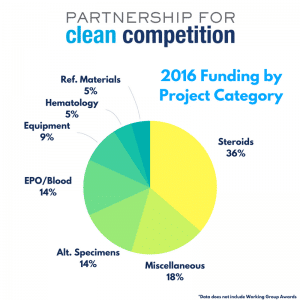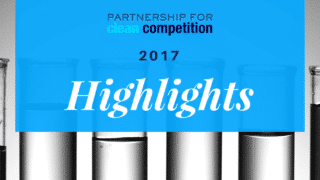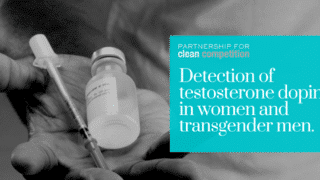In 2016 the PCC funded 22 research projects (not including Working Group awards). The following represents a breakdown of research as a product of project category. Projects were categorized by the PCC’S Scientific Advisory Board.
Steroids: 36%
Projects which study the the detection of anabolic agents accounted for eight funded projects in 2016, including:
Characterization of low temperature catalytic combustion reactors for steroids in fast GC-C-IRMS. Dr Herbert Tobias, Dell Pediatric Institute. (US)
Application of Dried Blood Spots in the Detection of Insulin and Testosterone Ester. Dr. Nikolai Nordsborg, University of Copenhagen. (DE)
Androgen Monitoring of Amateur and Young Athletes. Dr. Fred Schaufele, X-Cell Assay. (US)
Fellowship of Dr. Liying Jiang, King’s College London. (UK)
Real Time Screening for Novel Designer Drugs and Other Controlled Substances in Doping Control. Dr. James Harynuk, University of Alberta. (CA)
Testosterone Codeine Interaction Study (Micro-Grant). Dr. Lena Ekstrom, Karolinksa Institutet. (SE)
Urine Steroid Profile in Testosterone-Treated Female-to-Male (F2M) Transgender Men (Micro-Grant). Dr. David Handelsmann, Anzac Institute. (AU)
Novel Low Temperature Catalytic Combustion Reactors for Fast GCC/IRMS (Micro-Grant). Dr Herbert Tobias, Dell Pediatric Institute (Research performed at Cornell University). (US)
Miscellaneous: 18%
Miscellaneous projects not conforming to existing categories typically involve novel approaches to deterrence and detection efforts, and accounted for four funded projects in 2016, including:
Sensitive and Quick Detection of PEDs Using Microtoroid Optical Resonators. Dr. Judith Su, University of Arizona. (US)
Rapid Detection of Performance Enhancing Drugs Using Nanotechnology. Dr. Nico Voelcker, Monash University. (AU)
Mildronate Pilot Excretion Study (Micro-Grant). Dr. Mario Thevis, German Sport University Cologne. (DE)
Administration of Clomiphene: Short and Long Term Metabolism in an Anti-Doping Setting. Dr. Daniel Eichner, SMRTL. (US)
Alternative Specimens: 14%
Projects investigating methods for sample collection and analysis outside of currently used matrices (such as blood and urine) accounted for three funded projects in 2016, including:
Exhaled Breath in Doping Controls: Method Expansion, Optimization, Detection Window Determination. Dr. Mario Thevis, German Sport University. (DE)
Exhaled Breath as a Potential Alternative Matrix in Doping Controls: A Pilot Study. Dr. Mario Thevis, German Sport University. (DE)
DPS Card Manufacturing. Dr. Jack Henion, Q2 Solutions. (US)
EPO/Blood: 14%
Research investigating detection and analysis related to blood doping accounted for three funded projects in 2016, including:
Development of a Capillary-Electrophoresis Method for Detection of Recombinant Erythropoietins. Dr. Phillipe Desharnais, IRNS Sante. (CA)
Evaluating Erthroferrone as a New Marker of Erthropoesis Stimulators Abuse. Dr. Gaetano Cairo, University of Milan. (IT)
Rapid Detection of EPO Isoforms in Blood by Handheld Raman and Electrochemical Devices. Dr. Emad Kiriakous, Queensland University of Technology. (AU)
Equipment: 9%
Aptly titled ‘Center of Excellence’ grants, this funding is designed to ensure anti-doping testing facilities utilized by sponsor organizations are pre-eminent leaders in both techniques and technology utilized. COE grants accounted for two funded projects in 2016, including the purchase of Dried Blood Spot Automated Sampling Handler for both the SMRTL (US) and UCLA Olympic Lab. (US)
Hematology: 5%
Research investigating red blood cell population dynamics accounted for one funded project in 2016, including:
Conversion of the Hematologic Passport Testing for Use with Dried Blood Spots. Dr. Daniel Eichner, SMRTL. (US)
Reference Materials: 5%
Projects intended to create reference materials for the standardization of analysis across accredited laboratories accounted for one funded project in 2016, including:
Reference materials of long-term metabolite of Oral-Turinabol. Dr. Maria Parr. Freie Universität Berlin. (DE)





